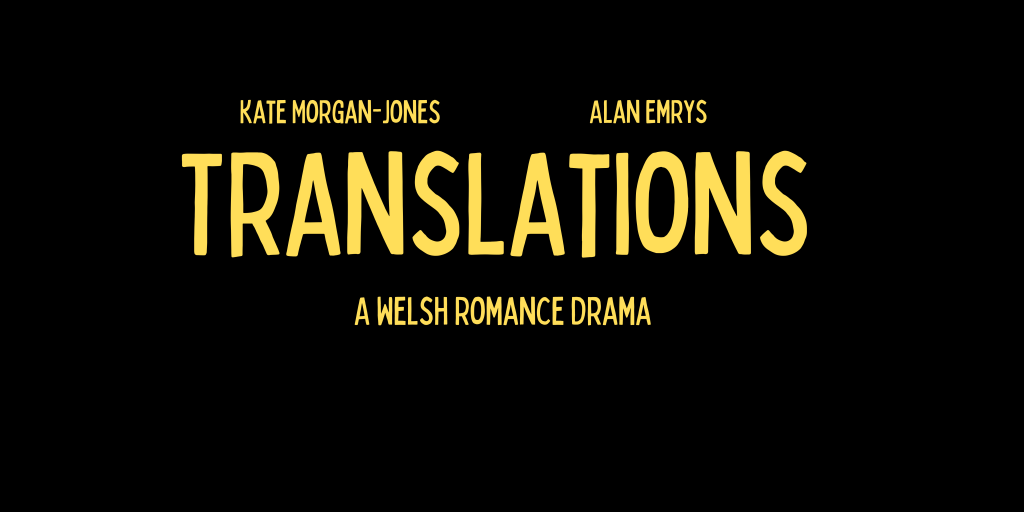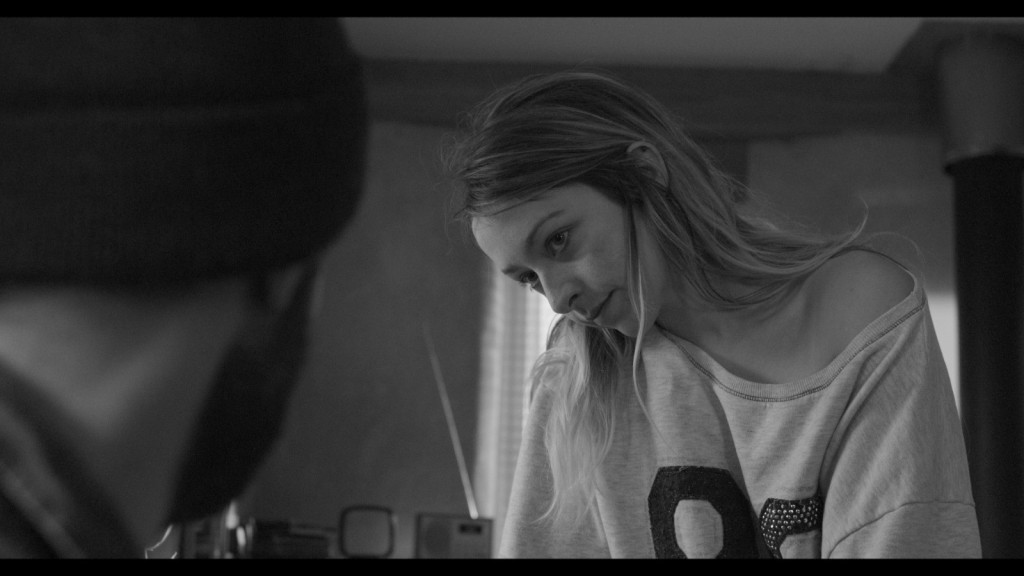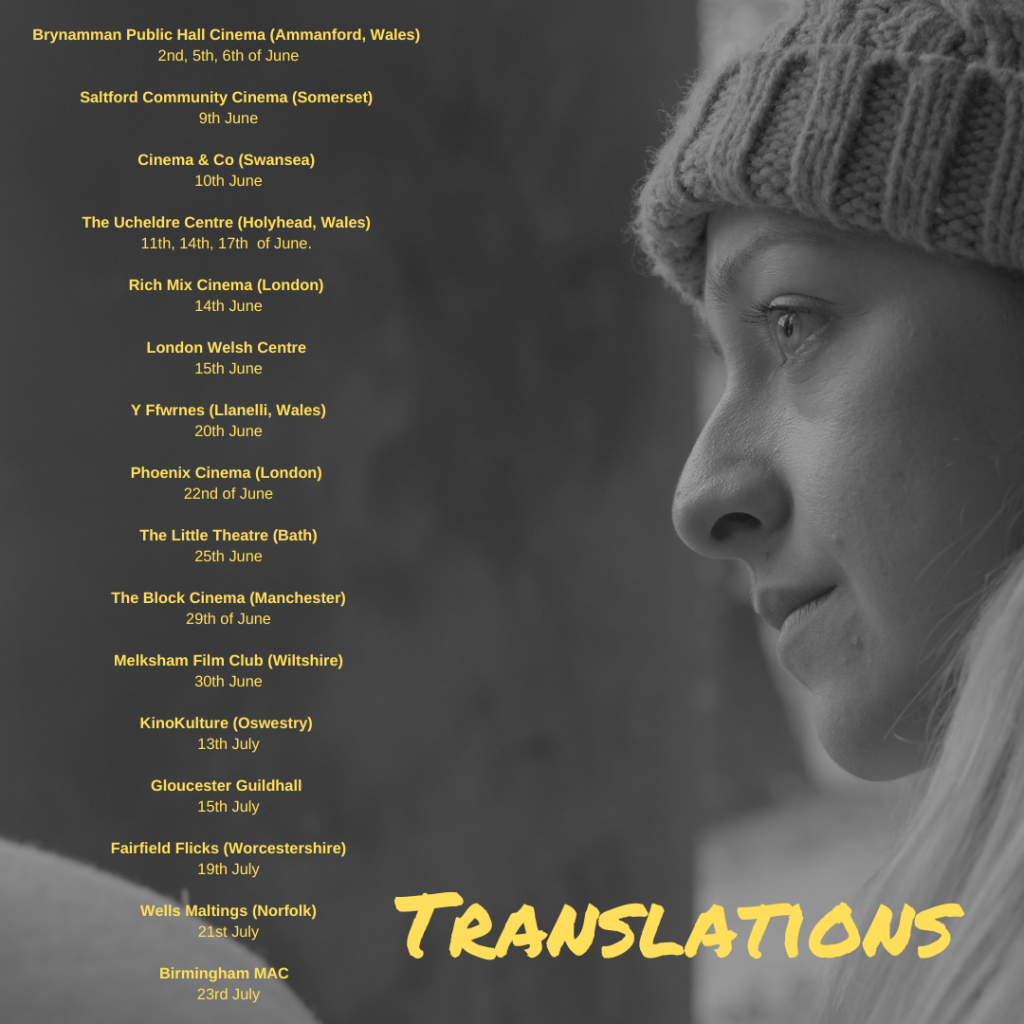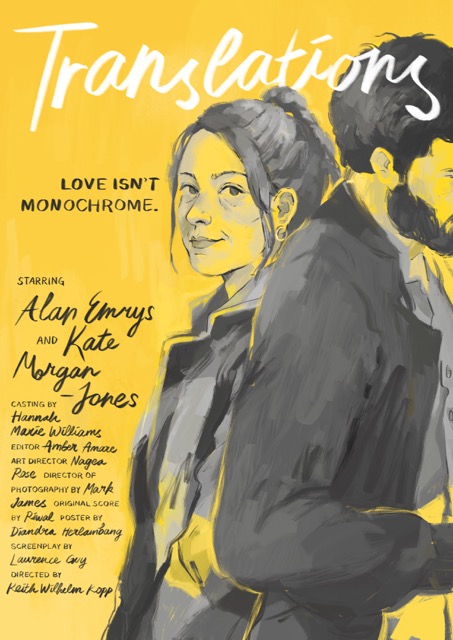by Helen Edwards
For those that are too busy to read this film review and to help our tech-conditioned ‘keep-it-quick’ minds please see the one liner below:
“A raw portrayal of the depths that a mental illness can reach with a glimpse of the impact on others and the eventual hope that can lead to recovery”
Or, if you’ve a few more seconds, read the Tweet-length review here:
“A reflective, unsettling film depicting mental ill health, grief and two people coming together to heal. Kate Morgan-Jones’ performance brings depth and skill with a brilliantly realistic scene showing a crisis episode. Walls are broken down and agoraphobia is given a platform for understanding”

I suspect I’ve lost a few of you. For those still reading, thank you. Here is the full lowdown of ‘Translations’, the black and white, romantic, mental health exposé drama set in Wales:
Most of my reviews are pretty long and I apologise each time I link one to a social media account. But I won’t change the length. Well, not for now at least. To write only a short piece would be a disservice to the people who have put their soul into the work. They deserve a full debrief for the hours and cash that they’ve ploughed in, usually with no guarantee of success. It takes a risk-taker and an entrepreneur, with often an activist’s determination to see a creative project through to the finish. This is especially true of a feature film where the stakes are higher than most other forms. Add to that a focus on topics that are vital but are difficult to portray, and you have a true passion-project worthy of review words. ‘Translations’ by director, Keith Kopp and writer, Laurence Guy is one such project.

From the opening scene where Stef, the main character, performed her poignant poem ‘Walls’, my gut was stilled into a contemplative but not wholly comfortable quiet. It was going to be one of those – a film that would take the viewer on a ride through dark, complex emotions. An internal rollercoaster where I knew I would be swirled through loop-the-loops of mental anguish. I wasn’t sure I was ready for this. Whispering, ‘please let it have a happy ending’ to myself, I sipped my tea and carried on.
Stef is in her twenties. She writes, talks to herself (who doesn’t?), and hasn’t left her house in a long time (years). Her beloved brother, Liam died whilst travelling with his best friend Evan (Alan Emrys). The story of how this happened is pieced together throughout the film. Stef’s mental health, which wasn’t great before, suffered hugely after his death with agoraphobia now ruling her reality. A few segments into the movie, and after a long absence, Evan arrives at Stef’s Welsh cottage. His presence transformed her walled-in existence. Laughter and chemistry ensued with the pair reminiscing shared childhood and teen memories. But close behind came an open window into the mental torment that gripped both characters. Morgan-Jones’ portrayal of an acute mental health crisis in Evan’s company was sublime and harrowing. The contradictory nature of desperately wanting help yet vehemently pushing it away and the deep shame that followed gave a true insight into an illnesses of the mind.
Evan, whilst trying to help Stef also gave many clues to his own health problems. These stemmed from his guilt at Liam’s death and his wanting to be invisible; to “soak into the walls so no one can see me… like a ghost”. Grief washed over them both and at times the feeling of angst ping-pongs between them with a competitive hue. A game of ‘who’s the most miserable?’ Stef and Evan share grief, mental health challenges and both feel trapped; one indoors and the other behind a camera. I was often left wondering, can the troubled really help the troubled?

I instantly questioned why the movie was in black and white. The answer revealed itself in an early scene which showed a framed picture hanging on Stef’s wall of a barren, lonely tree (seen a number of times during the film). Devoid of colour with all life stripped away, the tree evoked a feeling of isolated fear. I think many of us felt a version of this during the most stringent lockdown weeks of 2020, our own surface-level insight into agoraphobia. Black and white also gives a greater intensity and emotional impact on screen; the viewer needs to look closer for meaning and work harder for understanding. I wasn’t sure at first. I don’t love having to work whilst being entertained and I really did want to see the colour of the delicious sounding curry, but I became convinced that it was 100% the best choice of medium for ‘Translations’. I would have loved to see colour creep in towards the end during Stef’s transformation but perhaps this would have been too obvious, I’m no film director.
Other aspects of the movie that caught my attention included the film’s score. It created a strong ambience throughout and, along with the dialogue, dramatised the emotion and helped to share powerful messages. A slow, heavy beat often preceded a philosophical musing from one of the characters whilst the crescendoing thud-thud-thud staccato made me feel Stef’s anxieties as if they were my own. A stand out visual moment from the film that made me smile was seeing Evan rolling and smoking a cigarette. It made me reflect that despite the number of people who smoke ‘rollies’ we hardly ever see the ritualised making of them on screen. Parts of the film that will stay with me are readings of the ‘Walls’ and the ‘Line in the Sand’ poems. ‘Walls’ was performed twice in the movie and in a clever, circular finish, ‘Line in the Sand’ bought the film to its close. I would love these poem clips to go viral to illustrate what agoraphobia can feel like and to help people feel less alone and more hopeful.

Please go and see this film. You won’t come away feeling lighter but you will have a glimpse into a mental health challenge that, in its most severe form, affects well over a million people in the UK. Kate Morgan-Jones’ performance is believable, haunting and impactful. She understands the torment, the struggle and the complexity that accompanies mental health conditions and she shows this in every scene. The film has lingered in my mind and has got me thinking about all those conditions we know about but build walls around. Watch this movie to start breaking down these walls, to transform our ignorance into understanding and to help our neighbours, friends and families feel less alone and “locked inside (themselves)”. Please support this film and perhaps then we will begin to see more pictures that educate and give true insight into mental illness. Thank you ‘Translations’ for opening my eyes a little wider.
Written on 24/05/23 by Helen L Edwards
@helenledwards4
Awards:
Riverside Film Festival 2023 (Audience Choice Award for Best Feature Film, Best Actress, Best Screenplay)
‘Translations’ tour:
Screenings start on the 2nd June in Wales. It reaches The Little Theatre in Bath on the 25th June and the Melksham Film Club on the 30th June
For Tickets:
https://www.kwkopp.com/



Trending…..
A Junco Shakin’ Finale for Devizes Arts Festival at The British Lion
A leopard doesn’t change its spots, and neither does a British Lion. Watch other Devizes pubs change landlord, decor, attractions, and styles. Watch them close,…
A Chat With Lib Dem Candidate for Melksham & Devizes, Brian Matthew
You know I’m a lady’s man but nestled between chats with Green Party candidate Catherine and our forthcoming one with Kerry of Labour, I’m with…
Boomers Rule – “The Slambovian Circus of Dreams” at the Devizes Arts Festival, June 14th, 2024.
by Ian Diddamsphotos by Gail Foster Way back in the mists of time (August 2022 – y’know that REALLY, REALLY hot summer?) I saw the…
Talk in Code are All In for New Single
Swindon indie pop virtuosos Talk in Code released their brand new single, All In, Yesterday, via Regent Street Records. And We. Love. Talk in Code…
REVIEW – Devizes Arts Festival – The Sound Of Blue Note @ Assembly Room 13th June 2024
Cool, Man Andy Fawthrop Devizes Arts Festival’s programme continued on Thursday night, and it was time for a little jazz. As I often say (apparently)…
REVIEW – Devizes Arts Festival – Duo Tutti @ Assembly Room 13th June 2024
A Lunchtime Amuse-Bouche by Andy Fawthrop Devizes Arts Festival’s programme continued on Thursday afternoon with a lunchtime classical concert in the beautiful surroundings of the…
Discovering Antarctica: Heroic tales of Shackleton, Crean and Scott; at the Wharf Theatre for Devizes Arts Festival
John Winterton For the first time in a great number of years the Wharf Theatre was host to a show in this year’s Devizes Arts…
REVIEW – Devizes Arts Festival – Martin Simpson @ Corn Exchange 12th June 2024
Masterclass by Andy Fawthrop Devizes Arts Festival’s programme continued last night, and it was the turn of another big name to grace the stage of…
Award-Winning Devizes Scooter Club Revving for Rally!
Devizes Scooter Club put their braces together and their boots on their feet, for a moonstomping win of the Best Turned-Out Club at the 25th…
A Chat With Green Party Candidate For Melksham-Devizes, Catherine Read
Over the coming weeks I’m having cuppas with candidates of the Melksham-Devizes constituency crazy enough to indulge my political ignorance and endure my inane waffling;…












One thought on “Film Review: Translations”